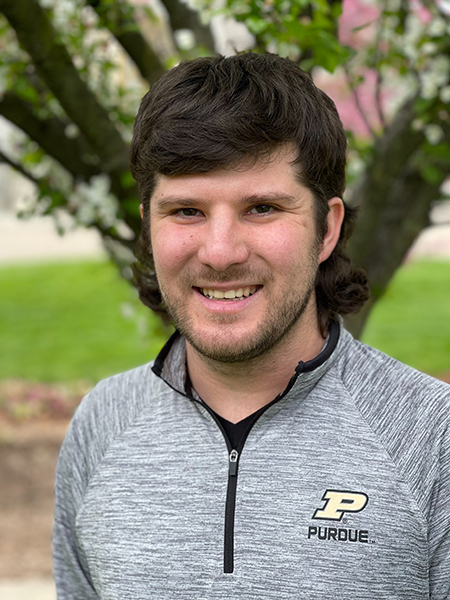Cristian Washburn

The practical teamwork, technical skills, and communication you learn in the project track will make you far more valuable in industry than just book knowledge alone.
Name: Cristian Washburn
What is your area of interest within ECE? IC design and Image Processing for Remote Sensing applications
Why did you choose the Project Track?
The Project Track is very practical to industry: it gives grad students a more realistic example of an innovative project development lifecycle: going through project ideation, requirements drafting, early product design, development, and testing of a prototype, and preparation for production or adapting for a full-scale product. Project Track also improves students’ abilities to maturely work within a team, technical communication skills, customer communication skills, and resource management. Some team-related interpersonal differences I’ve seen in our project mimic exactly the same type of challenges that I have seen in the workplace. A Course-Only track does not provide near as many of these opportunities and a Thesis Track is more personal rigorous academic research in preparation for a rigorous PhD thesis rather than solving a genuine problem in our world today. The opportunity to advance your team project to a start-up business is also a great opportunity.
What project are you working on?
My team is working on a Machine Learning solution to help the US Forest Service predict ground fire fuels simply from LIDAR data that can be collected much more rapidly than they can by sending teams out to the forest and sampling ground fire fuels manually. Our product will help them with Land Management to help them know what areas of forests need “cleaning up” to help prevent wildfires from spreading. Improved Land Management is important as wildfires are becoming a growing problem here in the US and across the world.
What do you like about the program? What skills have you gained?
I have had the opportunity to work with a very skilled team. My technical communication has definitely improved, I am learning vital interpersonal skills with teammates from other ethnic backgrounds, and I am definitely seeing that what seems to work on paper may not actually work in real life. I am also learning about Intellectual Property development and protection (our project is essentially an IP product). Probably the biggest thing though is the importance of Project Management: too often as engineers with technical expertise, we squirrel ourselves away and ignore the interfacing with others and maintaining a big-picture image that is necessary to develop a product with parts that work together as a whole.
How will earning the MSECE/participating in the project track help you reach your career goals?
My project track MSECE is already helping me reach career goals in the fact that any of the companies I have talked/interviewed with have expressed interest in the practicality of the program: how it teaches students to work in teams to work through the early stages of a project lifecycle and prepare their project for the later stages as well. I think the companies I have talked to have been interested because they are looking for people new employees with practical knowledge and not just theoretical/academic knowledge from textbooks or a formal thesis. Once I return to the workplace, I will have improved technical and project management knowledge and have experience in implementing that knowledge that I can bring back to the workplace to better help the organization I work for.
What advice would you give to a prospective student interested in the project track?
Personally, I would probably choose In-Person Project Track 100 times before course only; course only track will basically give you more book knowledge. The practical teamwork, technical skills, and communication you learn in the project track will make you far more valuable in industry than just book knowledge alone .
Now, if you know for sure you want to go on to a PhD in a specific topic, Thesis master’s may better for technical knowledge, but Project Track experience is going to better prepare you for industry and can still prepare you for PhD thesis depending on your project topic. If you are thinking you may be interested in a PhD after masters but are unsure, like I am, Project Track is still a good route because of the ability to enter straight into industry after masters if you don’t go on for PhD, but you’ve also gained practical technical work that will be valuable in a Thesis and you may work on a project topic that you become passionate about and want to extend to a PhD because you saw the need your project filled. Personal example: our project is groundbreaking work in the Wildfire Management industry according to our Forest Service contacts, and the work I am currently doing on it I could easily extend into a rigorous PhD Thesis.
